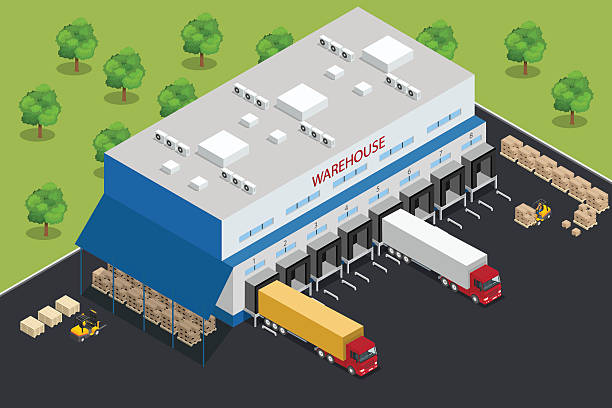The logistics supply chain is being transformed in great part by technology in the fast-changing corporate scene of today. Recent years have seen notable advancements in the logistics supply chain sector, which deals with commodities from point A to point B. These developments give companies a competitive edge in addition to raising efficiency. With an eye toward automation, data analytics, and e-commerce product fulfillment, this blog explores how technology is transforming the logistics supply chain.

1. The Rise of Automation in the Logistics Supply Chain
The broad acceptance of automation is one of the most obvious developments in the logistics sector. Robots, drones, and automated cars allow logistics firms to boost their speed and accuracy. Faster commodities sorting and packing made possible by automated warehouses is making them more common. Goods are now often moved within distribution centers using automated guided vehicles (AGVs).
These developments improve operational efficiency, lower labor costs, and minimize human error thereby simplifying the supply chain. Automation allows businesses—especially those in sectors like e-commerce, where speed is critical to customer satisfaction—to handle more products in less time.
How Does Automation Affect Ecommerce Product Fulfillment?
Automation profoundly affects product fulfillment for companies in the e-commerce space. Faster and more precise processing of orders means products reach consumers promptly. Automation lets e-commerce businesses meet demand for speedier delivery as consumer expectations keep rising, therefore enabling scalability of operations without sacrificing service quality.
2. Data Analytics for Smarter Decision-Making
Advanced analytics and big data are guiding decisions made by logistics firms toward more intelligence. Analyzing vast amounts of data has given understanding of everything from demand forecasts to inventory control. Data analytics helps businesses to spot inefficiencies, project delays, and route optimization opportunities.
Real-time data analysis allows businesses, for instance, to monitor shipments and make changes to stop delays. Predictive analytics also enables businesses to foresee demand, therefore guaranteeing that products are accessible as needed and so lowering the risk of either overstocking or understocking.
How Does Data Analytics Benefit Ecommerce Businesses?
Using data analytics will help e-commerce companies greatly enhance inventory control. Understanding purchase trends and anticipated demand helps businesses to maximize their stock levels. This guarantees not only that items are accessible when consumers order them but also helps to avoid waste of resources on extra inventory.
3. The Role of the Internet of Things (IoT)
The Internet of Things (IoT) is the network of connected, communally able physical objects linked to the internet. IoT-enabled devices track products in real time, monitor their condition, and guarantee that they reach their destination in the best shape in the logistics supply chain.
Sensors mounted on cargo track temperature, humidity, and even location, thereby giving vital data for companies to guarantee safe delivery of goods. IoT devices can notify operators in the case of any problems thereby enabling rapid interventions.
How Does IoT Help in Ecommerce Product Fulfillment?
IoT improves the client experience in e-commerce product fulfillment by guaranteeing that items arrive in the best possible state. For perishable items like food or medications, for instance, rigorous temperature control is needed throughout transportation. IoT devices help to guarantee that the cold chain stays intact, therefore avoiding rotting and guaranteeing that goods reach consumers in a condition fit for use.

4. Artificial Intelligence and Machine Learning
Because artificial intelligence (AI) and machine learning (ML) let systems learn and adapt over time, they are transforming the logistics supply chain. Systems driven by artificial intelligence can maximize paths, demand forecasts, and enhance the decision-making process. Analyzing past data using machine learning techniques helps one to more precisely forecast future trends.
Customer service is another area where artificial intelligence aids. Real-time client inquiries can be answered by chatbots and virtual assistants, therefore offering businesses and consumers immediate service. These systems get ever more dependable and efficient as machine learning algorithms develop.
How Can AI Improve Ecommerce Product Fulfillment?
AI can assist e-commerce organizations get ready for more demand and forecast peak buying hours, therefore streamlining their fulfillment operations. By helping to automate inventory control, AI guarantees that goods are kept and delivered when needed, therefore lowering the likelihood of stock outs or overstocking.
5. Transparency and Security Blockchain
Renowned for its part in cryptocurrencies, blockchain technology is finding use in the logistics supply chain by improving accountability, security, and openness. Blockchain produces an unchangeable digital ledger that logs every transaction, therefore offering an accurate and open record of products as they travel the supply chain.
Blockchain finds application in logistics for tracking shipments, verifying product authenticity, and even lowering fraud potential. Blockchain helps businesses to guarantee that every step of the product life is counted for, therefore enhancing operational effectiveness and customer confidence.
How Does Blockchain Affect Retailers?
Blockchain guarantees the validity of the goods e-commerce companies market. High-value items or products that are prone to counterfeiting especially depend on this. Using blockchain to confirm the validity and source of goods would help e-commerce businesses establish confidence with their consumers, therefore strengthening brand loyalty.
6. Cloud Computing to Offer More Flexibility
Logistics firms may now store enormous volumes of data and access it anywhere in the globe thanks to cloud computing. Using cloud-based solutions can help logistics firms to boost supply chain communication, save running costs, and increase flexibility. Real-time data exchange between suppliers, carriers, and consumers made possible by cloud systems helps to simplify operations.
For companies in e-commerce, cloud computing provides scale. Growing businesses may rapidly change their operations to satisfy new needs thanks to the cloud, therefore saving infrastructure costs.
How Does Cloud Computing Aid Ecommerce Product Fulfillment?
Cloud computing lets e-commerce product fulfillment’s real-time sharing of inventory levels, client orders, and shipment statuses easier. This guarantees correct and rapid shipment of products, helping e-commerce companies to effectively manage orders. Easy connectivity with outside logistics companies made possible by cloud technology helps companies to simplify their supply chain.

7. Autonomous Drones and Cars
Drone and autonomous cars are poised to completely overhaul the logistics supply chain. By delivering goods with minimum human involvement, these self-driving cars help to cut delivery times and expenses. Particularly drones are under testing for last-mile delivery, allowing businesses to avoid traffic and offer clients faster services by means of alternative routes.
Although many areas are currently in the experimental phases, the usage of autonomous cars and drones is likely to be revolutionary for the logistics sector in the not too distant future.
How Will Drones and Autonomous Vehicles Change Ecommerce?
Particularly for last-mile delivery, drone and driverless vehicle technologies will help e-commerce companies greatly. Faster and more dependable delivery comes from drones reaching rural or crowded regions more readily than from conventional delivery vans. Adoption of autonomous cars could also help to lower transportation expenses, thereby improving the general effectiveness of e-commerce product distribution.
Conclusion
Driving advances in efficiency, speed, and customer happiness, technology is fast changing the logistics supply chain. Goods are being supplied and transported in completely different ways thanks to innovations including automation, data analytics, IoT, artificial intelligence, blockchain, cloud computing, and autonomous vehicles. The logistics sector will get more efficient as these technologies develop so that companies may satisfy the rising needs of the contemporary market. Adopting these technology developments is crucial for e-commerce businesses to remain competitive and provide a first-rate client experience, especially when it comes to ecommerce product fulfillment.
Important Questions:
1. How can automation in logistics help ecommerce businesses?
In logistics, automation speeds up tasks like sorting, packing, and delivery, hence improving efficiency. Meeting the high expectations of e-commerce consumers depends on faster deliveries, which this guarantees, thereby reducing operational costs and minimizing errors.
2. What role does data analytics play in improving logistics supply chain efficiency?
Data analytics lets logistics firms make data-driven decisions, route optimization, inventory control, and demand demand prediction. This helps to lower delays, raise client happiness, and boost supply chain general efficiency.



